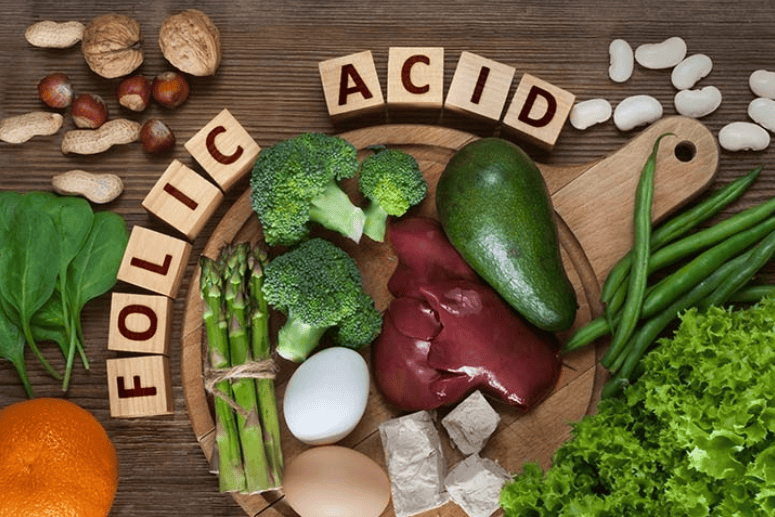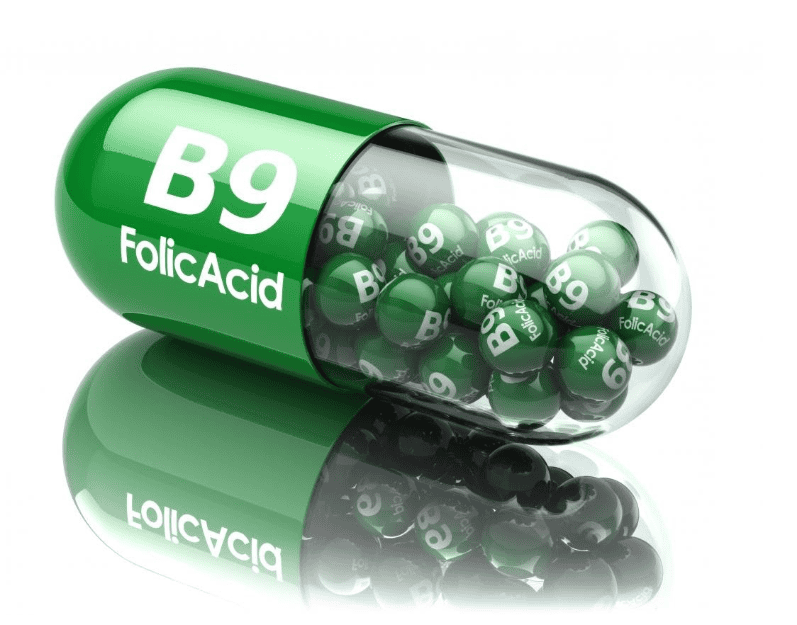
Folic acid plays a vital role in the growth and development of your baby, especially in the first trimester of pregnancy. Hence, folic acid supplements are often prescribed during pregnancy.
Folic acid plays a vital role in the growth and development of your baby, especially in the first trimester of pregnancy.
Hence, folic acid supplements are often prescribed during pregnancy. Let’s explore the importance of folic acid during pregnancy.
Folic acid, also called pteroylmonoglutamic acid, is the synthetic form of Folate (Vitamin B9). While folate is typically found in leafy vegetables, folic acid is present in fortified food items or supplements.

Doctors normally prescribe folic acid for pregnancy as it facilitates cell growth, production of red blood cells, and DNA formation. Thus, women who are pregnant or trying to get pregnant should start consuming folic acid daily before conception and must continue for at least three months after.
As stated earlier, folic acid aids the production of new cells. Naturally, when you are expecting, your body is dedicated to generating more cells for the baby’s development. Folic acid benefits the body as it helps in the creation of proteins, which form the building blocks of cells.
Here are the folic acid benefits for your baby’s developmental health:
Typically, the neural tubes develop into the spinal cord and brain by the 28th day since conception.
However, if the neural tubes fail to close properly, it results in a condition called neural tube defects (NTDs). The most prevalent forms of NTDs include:
Babies suffering from anencephaly may not survive, while those with spina bifida and encephalocele may struggle with a permanent disability.
Therefore, it comes as a relief that one of the greatest advantages of folic acid in pregnancy is that it prevents NTDs in babies.
In fact, it may cut down the risk of NTDs by an impressive 70%!
Congenital heart defects (CHDs) are abnormalities arising out of the underdevelopment of heart or nearby blood vessels before birth.
These developmental defects could adversely affect the heart, heart valves, arteries, and veins. Studies indicate that folic acid supplementation before pregnancy can reduce the risk of CHDs.
Folic acid can prevent structural anomalies and defects as it regulates homocysteine metabolism. As a result, it can prevent oral clefts in the lip or the palate.
Folic acid supplementation also inhibits uterine contractions, which could otherwise result in preterm birth (PTB) or miscarriage. PTB is a significant cause of neonatal mortality and morbidity.
Folic acid decreases the risk of developing anaemia during pregnancy, gestational diabetes, and other birth-related complications. Nearly 5% of women register a haemoglobin count that is less than 11.0g/dL, which is an indicator of anaemia.
The body requires folate, cobalamin (vitamin B12), and iron to produce more red blood cells. Hence, supplementing folic acid and vitamin B12 could bring down the chances of developing anaemia.
Similarly, folic acid supplementation can cut down the risk of developing gestational diabetes by 22% (for 400mcg supplements) and 30% (for 600mcg supplements).
Additional benefits of folic acid supplementation for pregnant women involve lower rates of placenta-related pregnancy complications.
This is because folic acid can regulate trophoblast invasion, which ensures regular implantation and placentation during gestation.

Ideally, the prescribed folic acid pregnancy dose is a minimum of 400 micrograms (mcg) per day.
However, a woman should typically consume about 600mcg of folic acid from all sources, including food and vitamin supplements.
Some women may be specifically advised to take folic acid supplements during pregnancy as their baby may be at higher risk of NTDs.
Mainly, this includes women who:
Folic acid admittedly has a few side effects. Certain individuals may find it hard to convert folic acid in the active 5-MTHF form.
As a result, their blood levels indicate a high concentration of unmetabolised folic acid. Chronically elevated levels of unmetabolized folic acid could increase cancer risk and vitamin B12 deficiency.
A study conducted in 2016 highlighted how women with high folate levels could birth a child with an autism spectrum disorder.
Adopting a healthy diet can supply naturally occurring folate to the body, alongside essential nutrients like calcium, fibre, and vitamins A and C.
Here are a few natural food sources of folic acid for intake during pregnancy:
Now that you understand the link between pregnancy and folic acid, you are in a better position to include it in your daily routine. It is an essential vitamin right from conception until you stop breastfeeding your child.
However, before you begin supplementation, it is wise to get your doctor’s opinion on the matter. To determine the correct folic acid dosage and any other pregnancy-related concerns, visit our specialists at CK Birla Hospital.
Written and Verified by:

Similar Gynaecology Blogs
Request a call back